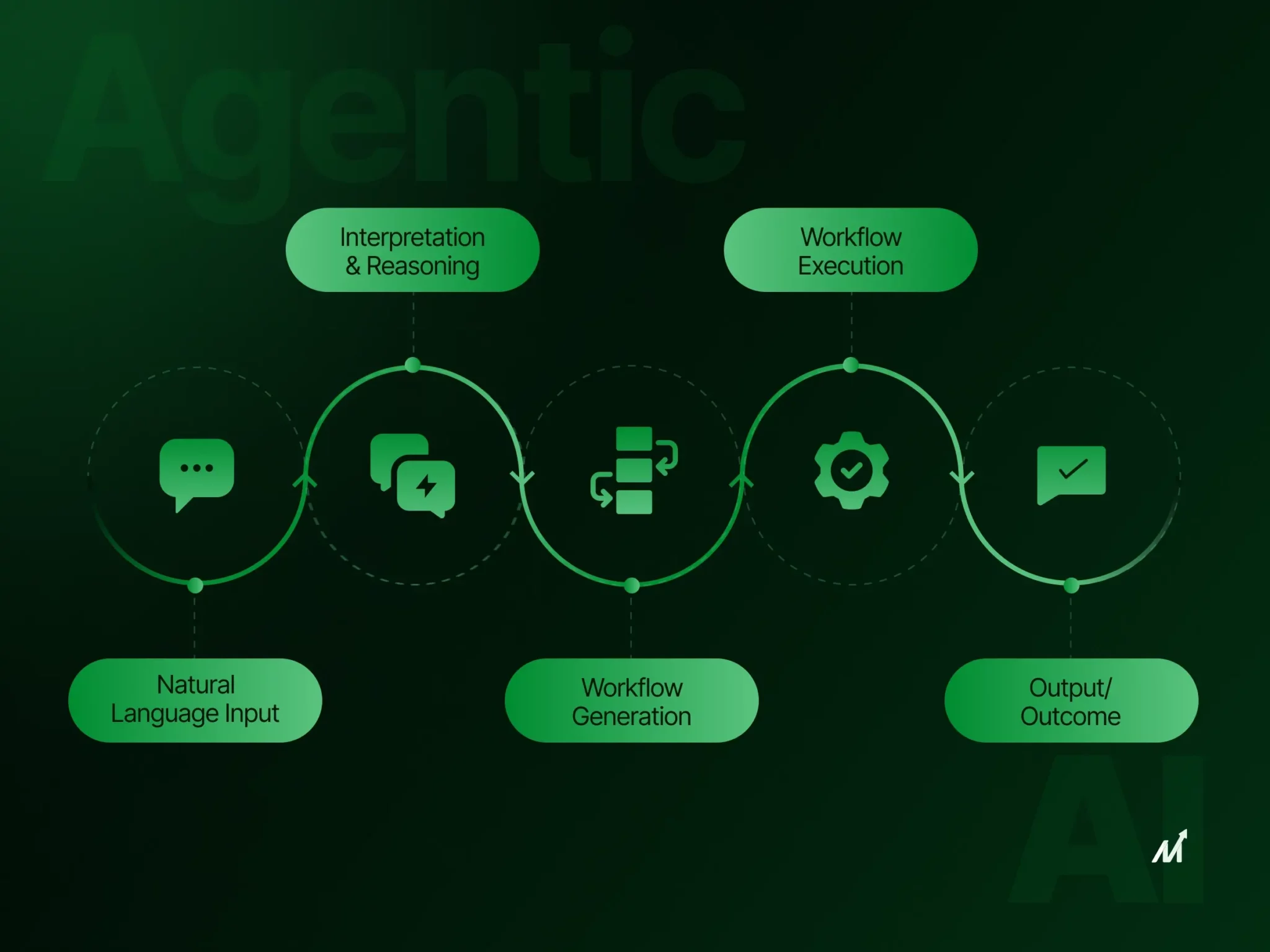Agentic AI sales is transforming how businesses connect with customers, heralding a new era in sales technology.
As traditional tools evolve to meet growing demands, the rise of agentic AI. These are AI systems capable of autonomous, adaptive decision-making, promising to revolutionize everything from lead generation to customer engagement. Unlike conventional AI, which follows predefined rules, agentic AI learns, adapts, and acts independently in real time.
This breakthrough allows businesses to automate complex sales processes, such as identifying high-value prospects, personalizing outreach, and nurturing customer relationships, all without constant human oversight. It not only streamlines workflows but also empowers teams to focus on building connections and closing deals.
Imagine a sales environment where intelligent systems anticipate customer needs, tailor communications, and even handle follow-ups with precision. Agentic AI sales transforms how organizations interact with their audiences, enabling smarter decision-making and higher efficiency at every stage of the customer journey.
This blog explores the transformative potential of agentic AI sales, shedding light on how it will reshape the sales landscape. From automating routine tasks to delivering hyper-personalized customer experiences, agentic AI is set to become a cornerstone of modern sales strategies. Businesses that understand and adopt this technology will gain a critical edge in a rapidly changing marketplace.
What is Agentic AI?
Agentic AI refers to a new class of artificial intelligence systems designed for autonomy, adaptability, and intelligent decision-making. Unlike traditional AI tools, which rely on predefined scripts or human guidance, agentic AI can operate independently, learn from its environment, and make contextually relevant decisions in real time. This makes it a powerful innovation for modern sales environments.
To understand the distinction, consider the difference between a traditional chatbot and agentic AI. A chatbot follows a set script, responding to customer queries with limited flexibility. If a question falls outside its programming, it hits a dead end. In contrast, agentic AI functions more like a highly skilled assistant who not only understands the current conversation but also interprets subtle cues, learns from past interactions, and adapts its responses to better serve the customer.

For instance, imagine a sales lead engaging with a website. A traditional CRM might record the visit and flag the lead for follow-up. With agentic AI, the system goes further: analyzing the lead’s behavior, determining their interests, and crafting a tailored email or even initiating a personalized conversation. Over time, it learns from responses, refining its approach for future interactions.
At its core, agentic AI acts as a collaborative tool rather than a replacement for human sales teams. It handles repetitive, time-intensive tasks—like qualifying leads or nurturing prospects—allowing sales professionals to focus on building relationships and closing deals. Think of it as a co-pilot, providing data-driven insights, automating routine processes, and making suggestions based on evolving customer needs.
By integrating agentic AI into sales strategies, businesses unlock new efficiencies and possibilities. It doesn’t replace the human element that is vital to sales success; instead, it amplifies it, enabling teams to work smarter, deliver more value, and achieve better outcomes.
What Are the Biggest Challenges When Adopting Agentic AI in Sales?
Sales teams exploring agentic AI face several challenges that can limit its impact if not addressed effectively. These include inefficiencies in lead generation, difficulties with creating personalized outreach at scale, data overwhelm, and inconsistencies in delivering a cohesive sales experience. Let’s examine these hurdles in more detail.
Accurate lead generation and qualification remain complex. Many traditional AI tools struggle to filter and rank leads effectively, often requiring manual adjustments. This slows down workflows and risks missing out on valuable opportunities. Agentic AI promises to address this, but the transition can reveal existing gaps in data and processes.
Scaling personalization is another significant barrier. While AI can automate communication, many systems fail to provide the tailored touchpoints customers expect. This often results in interactions that feel generic or disconnected from individual needs.
Sales teams also contend with overwhelming volumes of data generated by digital tools. Parsing through this information can become a time drain, reducing the ability to focus on strategy and customer engagement. Without intelligent systems to analyze and act on this data, opportunities can be missed.
Finally, inconsistent sales processes and customer experiences create a lack of trust and reliability. Agentic AI has the potential to unify processes and deliver a seamless experience, but implementing it requires careful alignment with existing workflows.
However, despite these issues they are merely teething issue when addressed correctly, and agentic AI can overcome these challenges, driving more effective and consistent outcomes for businesses.
How Agentic AI is Transforming Sales
Agentic AI is redefining the sales process, bringing unparalleled autonomy, adaptability, and intelligence to every stage of the customer journey. By analyzing data, adapting interactions in real-time, and automating tasks, agentic AI has the potential to revolutionize sales workflows. Let’s explore its transformative impact and the tools making it happen.
Enhanced Lead Generation
Agentic AI transforms lead generation by analyzing vast datasets to identify high-potential prospects. These systems assess behaviors, market trends, and CRM data to predict intent and prioritize leads with precision. Tools like Salesforce Einstein, Gong, and HubSpot utilize agentic AI to automate nurturing workflows, sending targeted follow-ups and reminders that streamline the sales pipeline.
- Salesforce Einstein: Predictive analytics to identify high-priority leads.
- Gong: Analyzes customer interactions across several mediums for data-driven insights.
- HubSpot: Automates lead scoring and personalized outreach.
By removing the guesswork from lead qualification and follow-up, agentic AI enables sales teams to focus on higher-value activities like closing deals and relationship building.
Hyper-Personalized Customer Experiences
Agentic AI enables dynamic, personalized customer journeys by analyzing user preferences, behaviors, and historical interactions. Platforms like tl;dv allow teams to capture and summarize customer conversations, ensuring that every touchpoint builds on the last for a cohesive experience.
- tl;dv: Captures and summarizes customer meetings for actionable follow-ups.
- Intercom: Personalizes customer interactions with adaptive AI-driven chat.
- Drift: Offers real-time support with conversational AI.
This level of personalization doesn’t just improve the customer experience—it builds trust, fosters loyalty, and drives higher conversion rates.
Dynamic Pricing and Negotiation
Agentic AI is revolutionizing pricing strategies by using real-time data to set optimal prices based on factors such as market demand, buyer behavior, and competitor pricing. Tools like Zilliant and PROS optimize pricing models to maximize revenue while maintaining competitiveness.
- Zilliant: AI-driven pricing optimization for revenue growth.
- PROS: Dynamic pricing based on real-time market analysis.
- Salesloft: AI-powered bots that assist in real-time negotiation.
Streamlined Sales Operations
Agentic AI reduces the burden of repetitive tasks, freeing sales teams to focus on strategic initiatives. Tools like Zoho SalesIQ and tl;dv automate CRM updates, meeting follow-ups, and task scheduling.
- Zoho SalesIQ: Automates tracking and CRM management.
- tl;dv: Streamlines meeting notes and follow-up tasks.
Predictive Insights and Analytics
Predictive analytics powered by agentic AI helps sales teams anticipate trends, identify risks, and make informed decisions. Platforms like Gong and Clari provide actionable insights into deal health, customer behavior, and revenue forecasts, although this comes with an associated high cost that may not always be 100% accurate.
- Gong: Analyzes sales calls to refine strategies.
- Clari: Predictive modeling for identifying at-risk deals.
Augmented Training and Support
Agentic AI enhances training by delivering tailored coaching and support programs. Real-time tools like Chorus.ai and Outreach analyze interactions and provide actionable feedback during live calls.
- Chorus.ai: Guides sales reps with real-time coaching.
- tl;dv: Offers personalized, adaptable guides to sales, and AI sales coaching feedback.
- Outreach: Provides personalized training and feedback.
Scalability Without Compromise
Agentic AI enables businesses to scale their sales efforts without sacrificing quality. Multilingual and multi-channel tools, such as Intercom and Zendesk, allow companies to engage customers across geographies and demographics seamlessly.
- Intercom: Delivers consistent multilingual support across platforms.
- Zendesk: Provides a unified customer service platform with AI-powered tools for consistent customer engagement.
Impact of Agentic AI on Sales Performance
Agentic AI is significantly enhancing sales performance across various industries. Here are some key statistics and case studies demonstrating its impact:
Increased Revenue Growth
The sixth Salesforce State of Sales Report indicates that 83% of sales teams utilizing AI experienced revenue growth in the past year, compared to 66% of teams not using AI.

Improved Efficiency
The same Salesforce report, also found that sales representatives spend 70% of their time on non-selling tasks, such as administrative work and meeting preparation. Agentic AI can automate many of these tasks, allowing sales teams to focus more on selling activities.
Case Study: Factspan
Factspan is a company specializing in strategic analytics, data science and AI. When the business implemented agentic AI to automate lead generation and personalize outreach, it significantly boosted sales. Their AI-powered system enabled efficient scaling and 24/7 engagement, leading to increased revenue and customer satisfaction.
These examples illustrate the transformative impact of agentic AI in sales, showcasing improvements in efficiency, revenue growth, and customer satisfaction.
Challenges and Ethical Considerations in Agentic AI Sales
While agentic AI brings immense opportunities, businesses must address critical challenges to implement it responsibly. Key concerns include data privacy, bias in AI algorithms, and maintaining the human connection in customer interactions.Data Privacy
As agentic AI collects and analyzes vast amounts of customer data to enable personalization, ensuring data privacy becomes paramount. Customers are increasingly aware of how their information is used and expect transparency and security. Missteps in data handling can lead to legal repercussions and loss of trust. To navigate this, businesses should:- Implement strong data encryption and anonymization protocols.
- Adhere to regulations like GDPR or CCPA.
- Clearly communicate how data is collected, stored, and used.
Bias Mitigation
AI algorithms are only as fair as the data they are trained on. Historical biases within datasets can lead to unintended discrimination in decision-making, impacting customer experiences and outcomes. For instance, bias in lead scoring could favor certain demographics over others. Strategies to mitigate bias include:- Using diverse and representative datasets during training.
- Regularly auditing AI systems for biased outcomes.
- Involving multidisciplinary teams to evaluate algorithmic decisions.
Maintaining Human Connection
Over-reliance on automation risks making customer interactions feel impersonal. While agentic AI excels at streamlining processes, customers still value authentic human engagement. Striking the right balance is critical. To maintain this connection:- Use AI for repetitive tasks, allowing sales teams to focus on meaningful interactions.
- Integrate human touchpoints strategically within the customer journey.
- Train teams to complement AI insights with empathy and understanding.
The Future of Sales with Agentic AI
Agentic AI is poised to reshape sales profoundly as it continues to evolve and integrate into workflows. With advancements in machine learning and natural language processing, these systems will become even more adaptive, providing deeper insights into customer needs and automating increasingly complex tasks.
In an AI-driven landscape, the role of sales professionals will shift from transactional tasks to more strategic and relational activities. Rather than focusing on data entry or lead qualification, sales teams will leverage AI insights to deliver tailored solutions, build stronger client relationships, and precisely navigate complex negotiations. This evolution underscores the need for sales professionals to develop empathy, creativity, and data interpretation skills to complement AI capabilities.
Emerging technologies, such as augmented reality (AR) and virtual reality (VR), may soon complement agentic AI in sales. For instance, AR-powered product demonstrations or VR-enabled client meetings could create immersive, personalized experiences that deepen engagement. Blockchain technology could enhance data security, ensuring ethical handling of sensitive customer information.
The impact of agentic AI is already evident in lead generation, hyper-personalization, streamlined operations, and predictive analytics. These transformations enable businesses to work smarter, engage customers more effectively, and drive better outcomes. As competition intensifies, adopting agentic AI tools is no longer optional but essential for staying ahead.
Businesses should take proactive steps to explore and implement agentic AI solutions. By investing in the right tools today, organizations can position themselves for sustainable success in the ever-evolving sales landscape. The time to act is now—embrace agentic AI and transform the future of sales.





